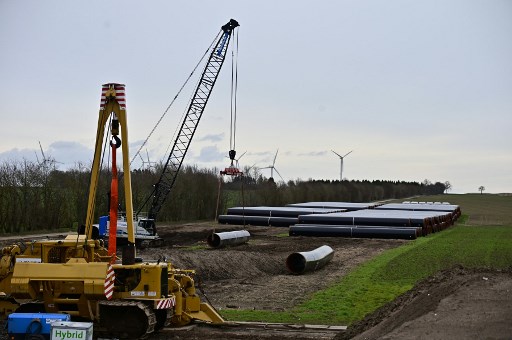Two U.S. senators, Republican Ted Cruz of Texas, and Democrat Jeanne Shaheen of New Hampshire, have introduced legislation to sanction companies involved in laying pipelines in the Baltic Sea for the Nord Stream 2 pipeline, which threatens Ukraine’s status as the major land-based transporter of Russian natural gas to Europe. Instead, if Russia and Germany get their way, the new twin line of Nord Stream — which will cost $11 billion — will double the capacity of the existing line to 110 billion cubic meters yearly.
While the pipeline has been in the works for years, given Russia’s aggressive assaults on the West — and its dismembering war against Ukraine since 2014 — the multibillion-dollar pipeline undermines Western attempts to reign in Kremlin dictator Vladimir Putin. Russia and Germany had hoped to complete the pipeline by the end of the year. That looks less likely now. And if the U.S. passes sanctions that target specialty firms constructing Nord Stream 2, the project may be tied up in legal disputes for years to come. Delays, of course, would force Russia to negotiate new gas-transit contracts to send supplies through Ukraine’s land-based pipelines, a business that means at least $2 billion yearly to Kyiv.
But Ukraine is not giving up without a fight to stop Nord Stream 2.
State-owned Naftogaz monopoly has hired Yorktown Solutions LLC to lobby U.S. President Donald J. Trump’s administration and try to persuade the U.S. Congress to enact sanctions against Nord Stream 2. The Washington, D.C.-based strategic advisory firm is led by Daniel Vajdich, who was a senior national security adviser for Cruz. He also worked for ex-Wisconsin Gov. Scott Walker and current Utah Sen. Mitt Romney.
Vajdich was involved in drafting two pieces of legislation passed by Congress and signed into law. During ex-U.S. President Barack Obama’s administration, the 2015 Ukraine Freedom Support Act and the 2014 Support for the Sovereignty, Integrity, Democracy, and Economic Stability of Ukraine Act authorized $350 million for lethal military assistance to Ukraine, imposed sanctions on Russia for its destabilization of Ukraine, and delivered $1 billion in loan guarantees to the Ukrainian government.
In the last year, Yorktown Solutions has promoted U.S. sanctions against the companies providing pipe-laying vessels for Nord Stream 2, specifically, according to the legislation introduced, against firms involved in laying pipes at depths of 100 feet or more below sea level. It doesn’t just apply to Nord Stream 2, but to constructions of Russian energy export pipelines, meaning the smaller Turkish Stream pipeline could be hurt too.
The backers note that Russia doesn’t have the technical skills to install pipelines and must hire non-Russian firms to complete the project. These firms are the ones targeted for sanctions.
Five companies around the world operate pipe-laying vessels: Saipem (Italy); Allseas (Switzerland); McDermott (U.S.); Technip (France); and COOEC (China), according to Yorktown Solutions. Russia’s state-owned Gazprom, which owns and operates nor operator of the project, has contracted with Allseas and Saipem to provide pipe-laying vessels.
Will the sanctions work?
They could. The companies would be banned from business and a whole host of financial transactions under U.S. jurisdiction. Such measures could harm a company’s prospects, but enough to deter them?
Despite Trump’s well-known affection for Putin, he’s strongly opposed the Nord Stream 2 pipeline and accused Germany of being captive to Russian natural gas supplies. Earlier this year, U.S. Ambassador to Germany Richard Grenell raised the possibility of U.S. sanctions to those companies involved. U.S. commercial interests are also involved, with America promoting its suppliers of liquified natural gas to Germany.
Reuters quoted German Foreign Minister Heiko Maas on Jan. 10 as rebuking the U.S. opposition to Nord Stream 2 “Questions of European energy policy must be decided in Europe, not in the U.S.,” Maas said, according to Reuters. “To impose unilateral sanctions against Nord Stream 2 is certainly not the way to go.”
The pipeline will be 1,230 kilometers in length and reaches landfall near Greifswald, Germany. According to the official website, more than 1,100 kilometers of pipeline has been laid in Finnish, Swedish and German waters and another 100-kilometer section will be built in Russian waters by the end of May. Denmark has held up a small section of the pipeline for environmental concerns, but it could ultimately just force Gazprom to reroute Nord Steam 2.
I hope the new U.S. sanctions drive slows the Nord Stream 2 pipeline, but I have serious doubts about whether it could be stopped at this stage of the construction. The time for that was five years ago, or more.
Still, a fight for what’s right is never a waste of time.



